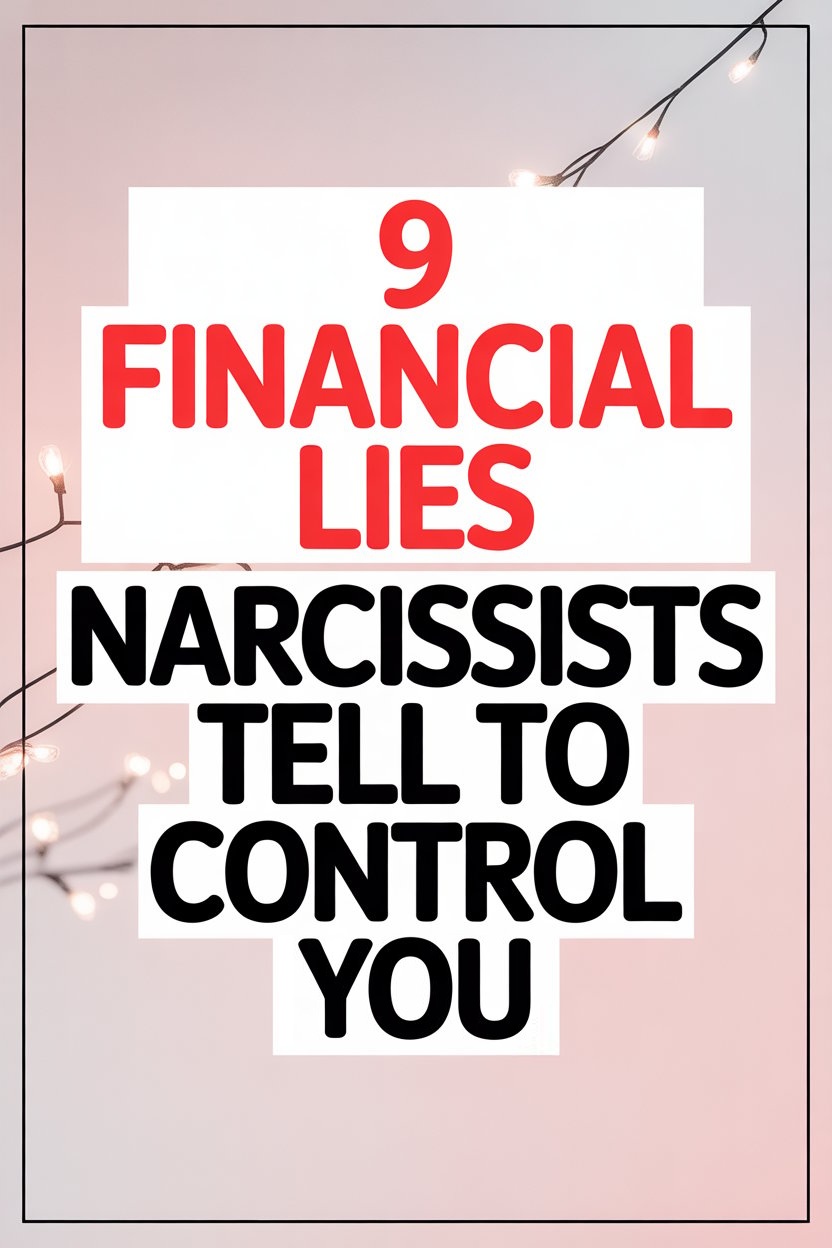Ever tried arguing with a narcissist about money? It’s a little like trying to nail jelly to a wall—messy, frustrating, and you’re guaranteed to end up the bad guy.
Narcissists have a special toolkit for financial control, and at the top of the list: flat-out lies. If you’ve found yourself wondering why your bank account feels like a haunted house and your partner seems to hold all the keys, you’re not alone.
Pull up a chair, clutch your wallet, and let’s get into the most common financial whoppers narcissists love to tell.
1 The Money’s All Gone
Suddenly, every bill is a surprise. Every paycheck evaporates like rain on hot tarmac.
Ask about the missing money, and you’ll get a sad story about unexpected expenses—broken water heaters, mysterious car repairs, or the classic “I had to help my mate, he’s in real trouble.”
Spoiler: the only real trouble is yours.
Narcissists use the disappearing-money trick to keep you off balance and reliant on them. If the funds are always “gone,” you can’t make plans or build independence.
Here’s the play: demand receipts. Ask for online access to joint accounts. If that’s met with rage or a guilt-trip that would make your nan blush, you’re not the problem here.
2 I’ll Handle the Finances Because I’m Better With Money
This one comes gift-wrapped in fake competence. Narcissists love to cast themselves as the responsible adult, the only one who’s “good with numbers.” Translation: “I want to keep you in the dark.”
Control is the name of the game. Managing all the money means calling the shots and keeping you dependent. Ask to be involved, and suddenly you’re “too emotional,” “bad with math,” or “just not interested, remember?”
The message: stay in your lane.
Here’s a radical idea: two adults, two sets of eyes on the money. It’s your life, too—don’t settle for being told to sit quietly at the kids’ table come bill-paying time.
3 We Can’t Afford That—But I Can
Funny how there’s never money for what you want, but always enough for their latest gadget, hobby, or expensive night out. Ever noticed how their needs are “essential” and yours are “wasteful”?
Welcome to the narcissist’s financial olympics, where only their events matter.
This lie is about enforcing a double standard. They get abundance; you get deprivation. The difference is “just common sense,” apparently. (If common sense means an entirely different rulebook for each of you.)
Push back by asking for a fair budget—one that accounts for both your needs and treats you like an equal partner, not their financial afterthought.
4 That Debt Was Your Fault
Here comes the blame train, right on schedule. Maxed-out card? “If you hadn’t wanted that holiday.” Missed payment? “You forgot to remind me.” Bank account overdrawn? “You always want the lights on, don’t you?”
Narcissists will rewrite history to avoid accountability, pinning any financial mess on your “carelessness.” Gaslighting at its finest.
Over time, this erodes your confidence, until you’re apologizing for the mortgage, the weather, and why bread costs what it does.
Keep records—bank statements, bills, anything that tracks spending. When the accusations start flying, facts are your best defense.
5 I’ll Pay You Back
Promises, promises. If you’re still waiting on last year’s “I’ll transfer you the money tonight,” you’re not alone. Money borrowed by a narcissist may as well be a gift, because it’s never coming back.
The “I’ll pay you back” lie creates a sense of obligation and keeps you hooked with hope. Meanwhile, your generosity gets weaponized: “I paid last time, remember?” Or worse, “Why are you so obsessed with money?”
The cure? Don’t lend what you can’t afford to lose. Set boundaries—polite, firm, and with zero apologies.
6 I Never Said That
Challenging a narcissist on financial matters often ends up in a fog of denial. Didn’t agree to pay the electric bill? Never promised to save for the kids’ school trip? “You must be confused, darling—that conversation never happened.”
This is gaslighting with a side of fiscal responsibility. They keep you second-guessing your memory, your sanity, and your right to question.
The endgame: you stop bringing it up, and they get to rewrite the household budget to suit themselves.
Write things down. Share emails or texts. When agreements are in writing, it’s harder for the goalposts to move.
7 You’re Lucky I Take Care of Everything
Ah, the benevolent dictator move. Narcissists will claim you’d be lost without them: “You’d have nothing if it weren’t for me.”
They might remind you of the roof over your head, the food you eat, and how “ungrateful” you are for questioning their generosity.
This is about shame, plain and simple. If you feel indebted, you’re less likely to challenge their control—or, heaven forbid, leave.
Refuse to buy the myth that you’re incapable. Take small steps to regain autonomy: open your own savings account, educate yourself about finances, and remind yourself that you’re not a charity case in your own marriage.
8 Money Doesn’t Matter to Me
Here’s a classic: pretending they’re above material things, even as they obsess over every penny you spend. “Money isn’t important,” they’ll sigh, “I just don’t want you wasting it.”
It’s not about greed—it’s about power. If you think they don’t care about money, you won’t notice how carefully they hoard it, dole it out, and keep you begging for a little more.
Actions speak louder than words. Trust what you see, not what you’re told. If money “doesn’t matter,” why are you living in a constant state of financial anxiety?
9 I’m Only Doing This for Us
Any time you question their tight grip on the purse strings, out comes the self-sacrifice routine. “This is for our future!” “I’m just trying to protect what we have!”
Suddenly, you’re selfish for wanting transparency, and they’re the martyr of fiscal responsibility.
This lie keeps you compliant by appealing to your sense of loyalty and fear of being “difficult.” Who wants to be the villain sabotaging your shared dreams?
Healthy relationships are built on shared decisions, not solo missions. Insist on mutual goals, joint planning, and a little less drama with your direct debits.
Taking Your Power (and Pocket) Back
Money should be a tool, not a weapon. If you recognize these lies cropping up in your relationship, don’t panic—but don’t ignore them, either.
Start small. Gather information, set up honest conversations, and don’t be afraid to call out the patterns that keep you stuck.
Get outside support—a trusted friend, a counselor, or even a financial adviser who won’t vanish when the receipts come out.
Your bank balance shouldn’t come with a side of psychological warfare. You deserve transparency, respect, and the chance to buy your own coffee once in a while.
Narcissists may have a hundred excuses, but your financial freedom doesn’t need their permission slip.


